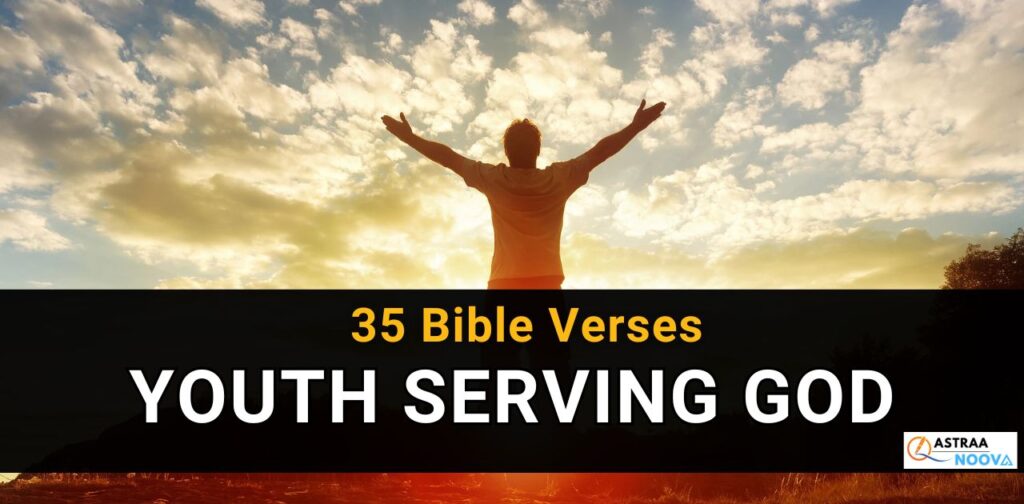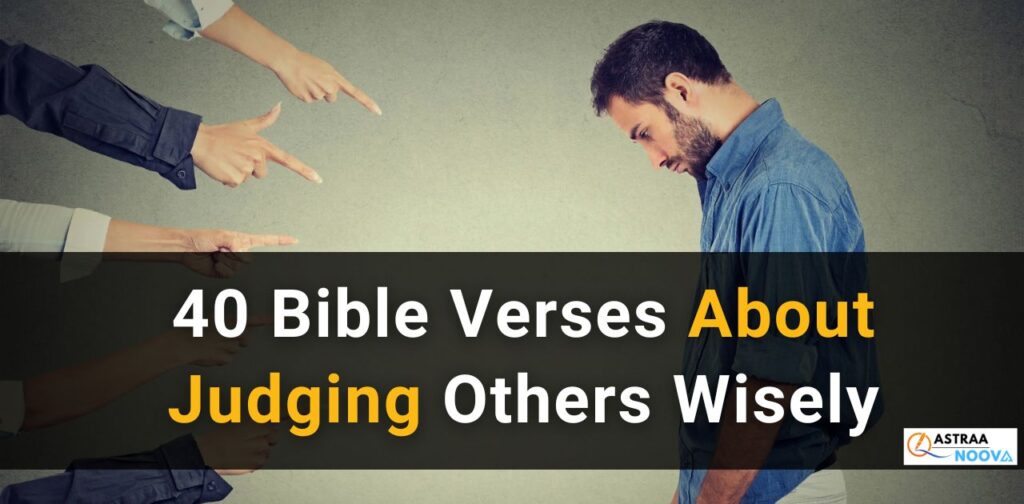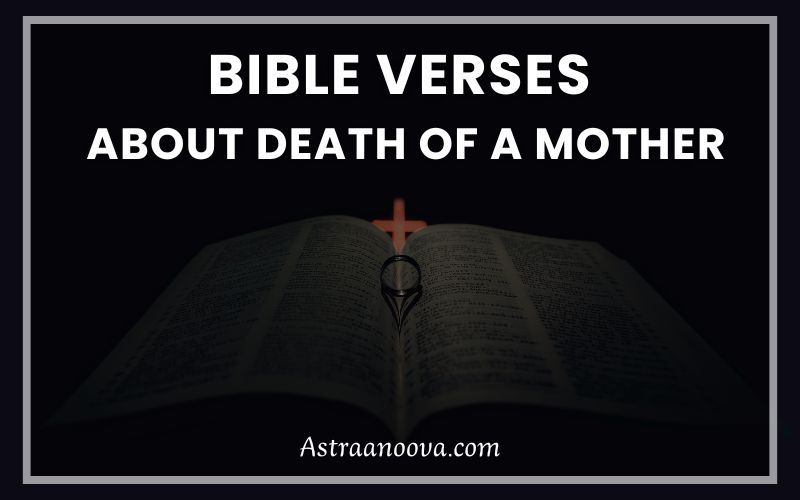Have you ever felt weighed down by guilt? That heavy feeling that comes after making a mistake or hurting someone? You’re not alone. Everyone experiences guilt at some point, and the Bible offers profound wisdom on dealing with these feelings.
The scriptures provide comfort and guidance for those struggling with guilt, showing us pathways to forgiveness and healing through God’s love and mercy. Whether you’re dealing with past mistakes or current struggles, these verses offer hope and direction.
Let’s explore what the Bible teaches us about guilt, forgiveness, and finding peace through faith. These carefully selected verses and their related passages will help you understand how to handle guilt in a spiritually healthy way.
Bible Verses about Guilt
The Bible addresses guilt with both compassion and wisdom, recognizing it as a universal human experience. These verses show us how God’s grace works to free us from the burden of guilt while teaching valuable lessons about repentance and growth.
Through these scriptures, we learn that guilt isn’t meant to be a permanent state but rather a stepping stone toward positive change and spiritual renewal. Let’s examine specific verses that address different aspects of guilt and its resolution.
Romans 3:23 – Understanding Guilt through Scripture
“For all have sinned and fall short of the glory of God” (Romans 3:23)
This reminds us that imperfection is part of the human condition. This foundational verse helps us understand that feeling guilty doesn’t make us uniquely flawed – it makes us human.
The related verses, including Psalm 51:5 and 1 John 1:8, reinforce this understanding by acknowledging our inherent tendency to make mistakes. These scriptures don’t excuse our actions but help us approach our guilt with a realistic perspective.
Supporting Verses:
“Behold, I was brought forth in iniquity, and in sin did my mother conceive me.”
(Psalm 51:5)
“If we say we have no sin, we deceive ourselves, and the truth is not in us.”
(1 John 1:8)
This teaching encourages us to face our guilt honestly while remembering that God’s love remains constant despite our shortcomings. It’s an invitation to seek forgiveness rather than remain trapped in shame.
Psalm 103:12 – Forgiveness in the Bible
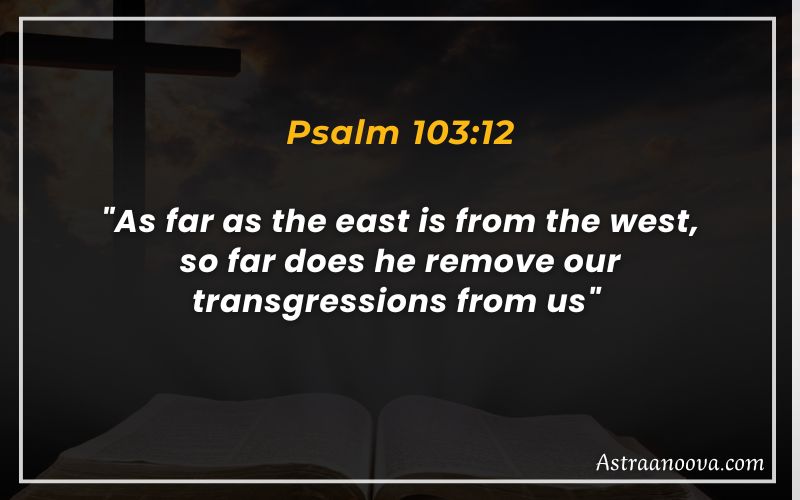
“As far as the east is from the west, so far does he remove our transgressions from us” (Psalm 103:12).
This beautiful metaphor illustrates the completeness of God’s forgiveness. When we truly seek forgiveness, God doesn’t just partially forgive – He removes our sins entirely.
Supporting Verses:
The depth of this forgiveness is further illustrated in :
“If we confess our sins, he is faithful and just to forgive us our sins and to cleanse us from all unrighteousness.” (1 John 1:9)
This promise of complete cleansing offers hope to those burdened by guilt.
Hebrews 10:17 adds another layer of comfort:
“Then he adds, ‘I will remember their sins and their lawless deeds no more.'”
This verse shows that divine forgiveness includes God choosing to no longer hold our past against us.
Psalm 38:4 – Overcoming Guilt with Biblical Wisdom
“For my iniquities have gone over my head; like a heavy burden, they are too heavy for me” (Psalm 38:4).
Here, David expresses what many of us feel when overwhelmed by guilt – that crushing weight that seems impossible to bear alone.
Supporting Verses:
Yet hope comes through Psalm 55:22:
“Cast your burden on the LORD, and he will sustain you; he will never permit the righteous to be moved.”
This verse offers practical guidance for dealing with guilt – we don’t have to carry it alone.
The path to relief is shown in Psalm 32:5:
“I acknowledged my sin to you, and I did not cover my iniquity; I said, ‘I will confess my transgressions to the LORD,’ and you forgave the iniquity of my sin.”
This progression from acknowledgment to confession to forgiveness provides a roadmap for guilt resolution.
Leviticus 5:5 – Guilt and Repentance in the Old Testament
“When he realizes his guilt in any of these and confesses the sin he has committed” (Leviticus 5:5)
It introduces the important connection between recognizing guilt and taking action through confession. This ancient wisdom remains relevant today.
Supporting Verses:
Leviticus 26:40 elaborates:
“But if they confess their iniquity and the iniquity of their fathers in their treachery that they committed against me, and also in walking contrary to me.”
This verse emphasizes the importance of honest acknowledgment of wrongdoing.
The process of repentance leads to renewal, as shown in Acts 3:19:
“Repent, therefore, and turn back, that your sins may be blotted out.”
This transformative promise shows how genuine repentance can lead to a fresh start.
2 Corinthians 7:10 – New Testament Teachings on Guilt
“For godly grief produces a repentance that leads to salvation without regret, whereas worldly grief produces death” (2 Corinthians 7:10).
This verse distinguishes between productive guilt that leads to positive change and destructive guilt that only brings despair.
Supporting Verses:
2 Corinthians 5:17 offers hope through transformation:
“Therefore, if anyone is in Christ, he is a new creation. The old has passed away; behold, the new has come.”
This promise shows how genuine repentance leads to renewal.
The practical outcome of this teaching appears in Proverbs 28:13:
“Whoever conceals his transgressions will not prosper, but he who confesses and forsakes them will obtain mercy.”
This wisdom encourages honest acknowledgment rather than hiding our faults.
Galatians 6:5 – Guilt and Accountability in Christian Life
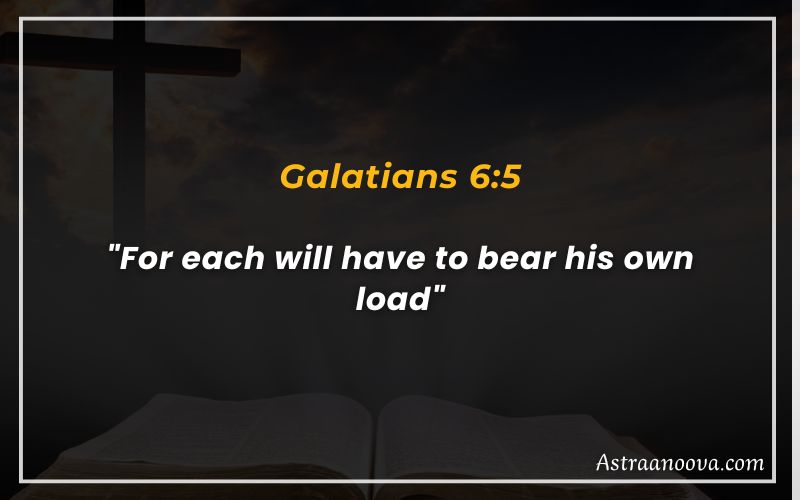
“For each will have to bear his own load” (Galatians 6:5)
This teaches personal responsibility while acknowledging our need for divine assistance. This balance helps us approach guilt with both humility and hope.
Supporting Verses:
Galatians 6:7 reinforces this principle:
“Do not be deceived: God is not mocked, for whatever one sows, that will he also reap.”
This reminder of accountability encourages thoughtful consideration of our actions.
As Romans 14:12 states:
“So then each of us will give an account of himself to God.”
This accountability, rather than inducing fear, should motivate us toward righteous living and prompt reconciliation when we fall short.
1 John 1:9 – The Role of Confession in Alleviating Guilt
The promise in 1 John 1:9 brings comfort:
“If we confess our sins, he is faithful and just to forgive us our sins and to cleanse us from all unrighteousness.” (1 John 1:9)
This verse offers a clear path to freedom from guilt through honest confession.
Supporting Verses:
Proverbs 28:13 provides practical wisdom:
“Whoever conceals his transgressions will not prosper, but he who confesses and forsakes them will obtain mercy.”
This teaching emphasizes both confession and the commitment to change.
Psalm 32:6 adds urgency to this call:
“Therefore, let everyone who is godly offer prayer to you at a time when you may be found; surely in the rush of great waters, they shall not reach him.”
This encourages prompt action in seeking forgiveness.
Hebrews 9:12 – Redemption and Guilt in Biblical Stories
“He entered once for all into the holy places, not by means of the blood of goats and calves but by means of his own blood, thus securing an eternal redemption” (Hebrews 9:12).
This profound verse illustrates the completeness of Christ’s sacrifice for our redemption.
Supporting Verses:
Ephesians 1:7 elaborates on this truth:
“In him we have redemption through his blood, the forgiveness of our trespasses, according to the riches of his grace.”
This reminder of grace provides comfort to those struggling with persistent guilt.
The ongoing effect of this redemption appears in 1 John 1:7:
“But if we walk in the light, as he is in the light, we have fellowship with one another, and the blood of Jesus his Son cleanses us from all sin.”
This verse shows how redemption leads to restored relationships.
Also Read >> 45 Most Weird or Bizarre Bible Verses
Romans 8:1 – Grace and Guilt
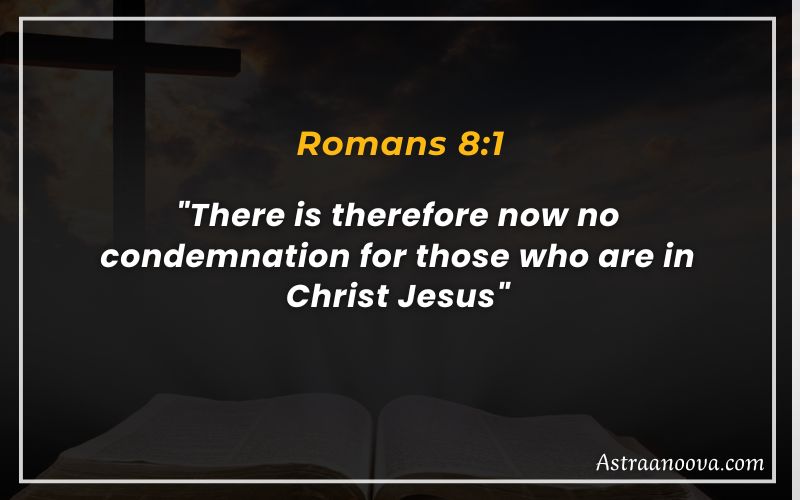
“There is therefore now no condemnation for those who are in Christ Jesus” (Romans 8:1).
This powerful declaration offers freedom from the burden of guilt through faith in Christ.
Supporting Verses:
Titus 2:11 expands on this grace:
“For the grace of God has appeared, bringing salvation for all people.” This universal offer of salvation demonstrates divine love’s inclusive nature.
The practical application appears in Hebrews 4:16:
“Let us then with confidence draw near to the throne of grace, that we may receive mercy and find grace to help in time of need.” This invitation encourages us to seek divine help when struggling with guilt.
Psalm 147:3 – Bible Verses for Healing Emotional Guilt
“He heals the brokenhearted and binds up their wounds” (Psalm 147:3).
This tender promise addresses the emotional pain that often accompanies guilt, offering hope for inner healing.
Supporting Verses:
Matthew 11:28 extends Christ’s invitation:
“Come to me, all who labor and are heavy laden, and I will give you rest.”
This verse specifically addresses those burdened by guilt and shame.
The assurance of divine presence appears in Psalm 34:18:
“The Lord is near to the brokenhearted and saves the crushed in spirit.”
This promise of God’s nearness provides comfort during times of guilt-induced distress.
Genesis 3:10 – Biblical Examples of Guilt and Consequences
“He answered, ‘I heard you in the garden, and I was afraid because I was naked; so I hid'” (Genesis 3:10).
This first recorded instance of human guilt demonstrates how shame often leads to hiding from God rather than seeking restoration.
Supporting Verses:
Matthew 27:3 presents another powerful example:
“Then Judas, who had betrayed Him, when he saw that He had been condemned, was remorseful and brought back the thirty pieces of silver to the chief priests and elders.”
This illustrates how unresolved guilt can lead to despair without proper resolution.
The story of the prodigal son in Luke 15:17 offers hope:
“But when he came to himself, he said, ‘How many of my father’s hired servants have bread enough and to spare, and I perish with hunger!'”
This realization led to restoration and reconciliation.
Psalm 32:3-4 – The Psychological Impact of Guilt and Biblical Remedies
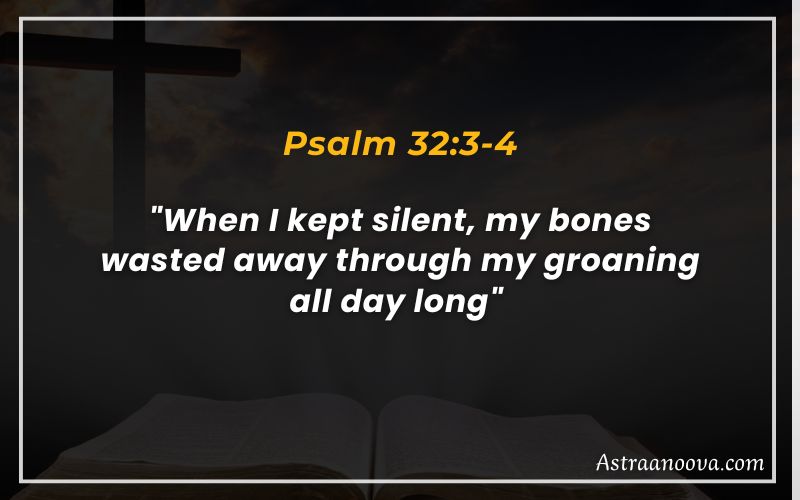
“When I kept silent, my bones wasted away through my groaning all day long” (Psalm 32:3-4).
This vivid description acknowledges the physical and emotional toll that unresolved guilt can take on an individual.
Supporting Verses:
Proverbs 12:25 recognizes emotional struggles:
“Anxiety in a man’s heart weighs him down, but a good word makes him glad.”
This wisdom demonstrates the power of encouragement in helping others overcome guilt.
The therapeutic value of confession appears in James 5:16:
“Therefore confess your sins to each other and pray for each other so that you may be healed. The prayer of a righteous person is powerful and effective.”
John 8:10-11 – Guilt in the Teachings of Jesus
Jesus’ response to the woman caught in adultery provides a masterclass in handling guilt:
“Woman, where are they? Has no one condemned you?… Then neither do I condemn you. Go now and leave your life of sin” (John 8:10-11).
Supporting Verses:
Luke 19:10 explains Christ’s mission:
“For the Son of Man came to seek and to save the lost.”
This purpose statement shows divine intent toward restoration rather than condemnation.
The transformative power of faith appears in John 5:24:
“Truly, truly, I say to you, whoever hears my word and believes him who sent me has eternal life. He does not come into judgment but has passed
from death to life.”
James 5:16 – The Power of Prayer in Overcoming Guilt
“Therefore, confess your sins to each other and pray for each other so that you may be healed. The prayer of a righteous person is powerful and effective” (James 5:16).
This verse establishes the connection between confession, prayer, and healing from guilt.
Supporting Verses:
James 5:13 provides practical guidance:
“Is anyone among you in trouble? Let them pray. Is anyone happy? Let them sing songs of praise.”
This instruction shows how prayer serves as a response to all emotional states, including guilt.
Ephesians 6:18 expands on this practice:
“And pray in the Spirit on all occasions with all kinds of prayers and requests. With this in mind, be alert and always keep on praying for all the Lord’s people.”
This emphasizes the comprehensive nature of prayer in spiritual healing.
Psalm 38:18 – Biblical Counsel for Dealing with Guilt After Sinning
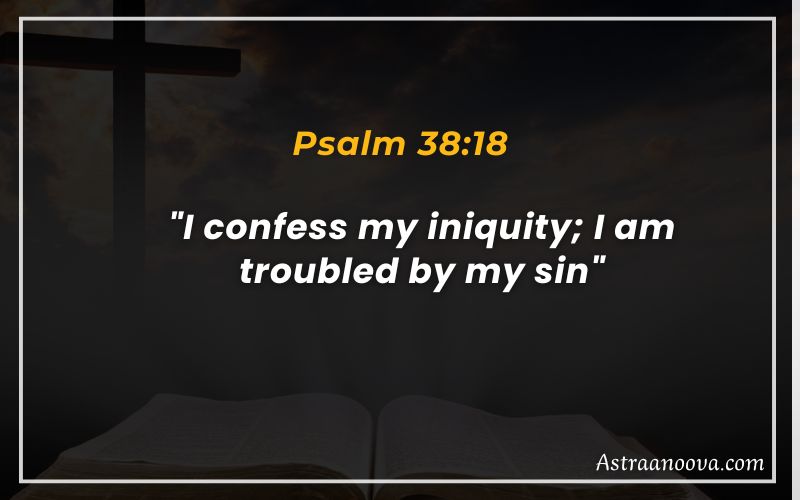
“I confess my iniquity; I am troubled by my sin” (Psalm 38:18).
This honest acknowledgment from David demonstrates the importance of accepting responsibility for our actions as the first step toward healing.
Supporting Verses:
Psalm 51:3 deepens this confession:
“For I know my transgressions, and my sin is always before me.”
This awareness leads to genuine repentance rather than superficial remorse.
The transformative power of confession appears in Psalm 32:5:
“Then I acknowledged my sin to you and did not cover up my iniquity. I said, ‘I will confess my transgressions to the Lord.’ And you forgave the guilt of my sin.”
2 Peter 3:18 – The Relationship Between Guilt and Spiritual Growth
“But grow in the grace and knowledge of our Lord and Savior Jesus Christ” (2 Peter 3:18).
This verse shows how handling guilt properly can lead to spiritual maturity and deeper understanding.
Supporting Verses:
Philippians 1:6 offers encouragement:
“He who began a good work in you will carry it on to completion until the day of Christ Jesus.”
This promise assures us that growth continues even through struggles with guilt.
Romans 8:28 provides perspective:
“And we know that in all things God works for the good of those who love him, who have been called according to his purpose.”
This includes using our experiences with guilt for spiritual development.
Galatians 5:1 – Biblical Verses on the Liberation from Guilt
“Stand firm, then, and do not let yourselves be burdened again by a yoke of slavery” (Galatians 5:1).
This powerful directive encourages believers to maintain their freedom from guilt rather than returning to old patterns of shame.
Supporting Verses:
John 8:36 reinforces this freedom:
“So if the Son sets you free, you will be free indeed.”
This promise demonstrates the completeness of liberation through faith, showing that guilt need not be a permanent burden.
The practical foundation appears in 2 Thessalonians 3:3:
“But the Lord is faithful, and he will strengthen you and protect you from
the evil one.”
This assurance provides confidence in maintaining freedom from guilt.
2 Corinthians 7:10 – The Difference Between Godly Sorrow and Worldly Guilt
“Godly sorrow brings repentance that leads to salvation without regret, whereas worldly sorrow brings death” (2 Corinthians 7:10).
This crucial distinction helps believers understand productive versus destructive forms of guilt.
Supporting Verses:
The path of godly sorrow leads to transformation, as shown in Ezekiel 18:32:
“For I take no pleasure in the death of anyone, declares the Sovereign Lord.
Repent and live!”
This reveals divine desire for our restoration rather than condemnation.
The outcome of godly sorrow appears in spiritual growth and renewed purpose, distinct from the paralysis of worldly guilt that leads only to despair and hopelessness.
Psalm 51:10 – Coping with Guilt through Biblical Teachings
“Create in me a clean heart, O God, and renew a right spirit within me” (Psalm 51:10).
This prayer from David demonstrates the possibility of complete renewal after experiencing guilt.
Supporting Verses:
Psalm 51:2 expresses the desire for thorough cleansing:
“Wash me thoroughly from my iniquity, and cleanse me from my sin!”
This shows how biblical teaching encourages active seeking of restoration.
Isaiah 55:7 provides the divine response:
“Let the wicked forsake his way, and the unrighteous man his thoughts; let him return to the LORD, that he may have compassion on him, and to our God, for he will abundantly pardon.”
Romans 8:1 – Biblical Verses on the Liberation from Guilt
“There is therefore now no condemnation for those who are in Christ Jesus” (Romans 8:1).
This foundational truth establishes complete freedom from guilt through faith, offering hope to those struggling with persistent shame.
Supporting Verses:
The practical application appears in John 8:36:
“If the Son sets you free, you will be free indeed.”
This promise demonstrates that liberation from guilt isn’t partial but complete when we embrace divine forgiveness.
2 Thessalonians 3:3 provides ongoing assurance:
“But the Lord is faithful, and he will strengthen you and protect you
from the evil one.”
This verse shows how divine support maintains our freedom from guilt’s burden.
Micah 7:18 – God’s Mercy on the Guilty: Biblical Insights
“Who is a God like you, pardoning iniquity and passing over transgression for the remnant of his inheritance? He does not retain his anger forever, because he delights in steadfast love” (Micah 7:18).
This beautiful description reveals divine character in dealing with guilt.
Supporting Verses:
Numbers 14:18 reinforces this truth:
“The LORD is slow to anger and abounding in steadfast love, forgiving iniquity and transgression.”
This demonstrates the consistent nature of divine mercy toward those struggling with guilt.
The practical outworking appears in Psalm 103:10:
“He does not deal with us according to our sins, nor repay us
according to our iniquities.”
This assurance helps believers trust in God’s merciful response to their guilt.
Psalm 38:4 – Using Bible Verses to Understand Personal Guilt
“For my iniquities have gone over my head; like a heavy burden, they are too heavy for me” (Psalm 38:4).
This profound expression of personal guilt resonates with many who feel overwhelmed by their past actions.
Supporting Verses:
Isaiah 64:8 provides perspective on divine guidance:
“Yet you, Lord, are our Father. We are the clay, you are the potter; we are all the work of your hand.”
This metaphor helps us understand how personal guilt can be shaped into growth through divine intervention.
Psalm 32:8 offers direction:
“I will instruct you and teach you in the way you should go; I will counsel you with my loving eye on you.”
This promise shows how understanding guilt through scripture leads to practical guidance for life change.
Also Read >> 35 Bible Verses About Youth Serving God
Ephesians 4:32 – Guilt and Forgiveness in Christian Relationships
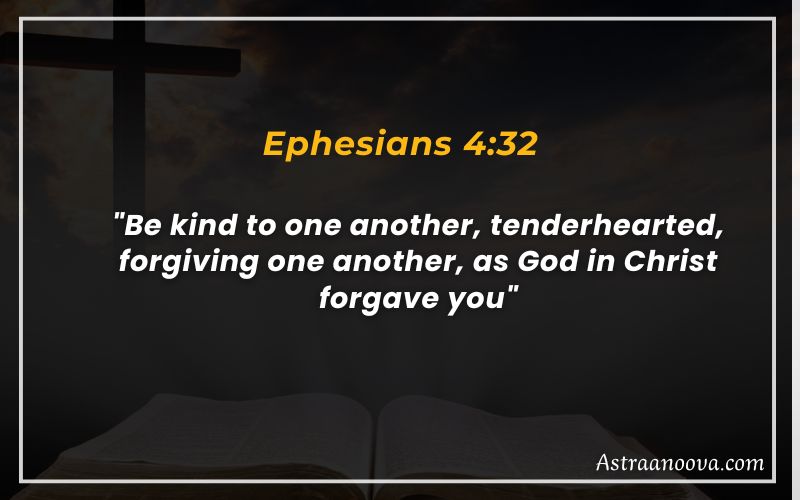
“Be kind to one another, tenderhearted, forgiving one another, as God in Christ forgave you” (Ephesians 4:32).
This instruction establishes the connection between receiving divine forgiveness and extending it to others in our relationships.
Supporting Verses:
Colossians 3:13 reinforces this principle:
“Bear with each other and forgive one another if any of you has a grievance against someone. Forgive as the Lord forgave you.”
This demonstrates how understanding our own forgiveness enables us to forgive others.
Matthew 5:23-24 provides practical guidance:
“Therefore, if you are offering your gift at the altar and there remember that your brother or sister has something against you, leave your gift there in front of the altar. First go and be reconciled to them; then come and offer your gift.”
This emphasizes the priority of resolving guilt in relationships.
Matthew 18:21-22 – Teaching Children About Guilt and Forgiveness Through Bible Verses
“Then Peter came up and said to him, ‘Lord, how often will my brother sin against me, and I forgive him? As many as seven times?’ Jesus said to him, ‘I do not say to you seven times, but seventy-seven times'” (Matthew 18:21-22).
This dialogue provides a clear framework for teaching children about unlimited forgiveness.
Supporting Verses:
Matthew 6:15 presents an important principle:
“But if you do not forgive others their sins, your Father will not forgive your sins.”
This helps children understand the reciprocal nature of forgiveness and its importance in spiritual growth.
Proverbs 22:6 offers guidance for parents:
“Train up a child in the way he should go; even when he is old he
will not depart from it.”
This emphasizes the lasting impact of teaching children biblical principles about handling guilt and extending forgiveness.
Final Thoughts on Dealing with Guilt Biblically
The journey through these Bible verses reveals a comprehensive approach to handling guilt. Scripture shows us that while guilt is a universal human experience, it need not be a permanent state. Through confession, repentance, and acceptance of divine forgiveness, we can find freedom from guilt’s burden.
These teachings provide practical steps toward healing: acknowledge wrongdoing, seek forgiveness, accept grace, and move forward in freedom. The biblical pattern shows that guilt should serve as a catalyst for positive change rather than a chain that binds us to past mistakes.

Multilingual faith educator exploring connections between language, spirituality, and dream symbolism.




